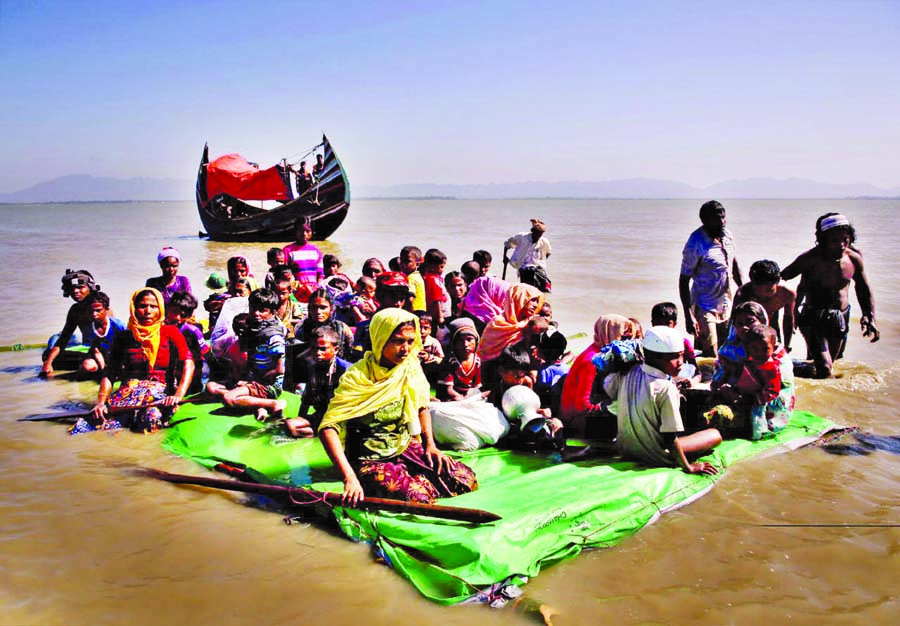
Sagar Biswas :
Dhaka is now putting hope in formation of a joint working group with the involvement of Naypyidaw to repatriate the displaced Rohingyas who have entered Bangladesh following an aggressive cleansing operation conducted by the Myanmar army.
Diplomatic sources think, it would be a major breakthrough in Rohingya repatriation process, if the joint working group was formed within the desired timeframe – by November 30.
But at the same time they fear, the repatriation of Rohingyas would be a far cry until the Myanmar authorities would not change its present negative attitude towards the ethnic minorities of the Rakhine state and consider them as their nationals.
Expressing hope, Home Minister Asaduzzaman Khan Kamal on Thursday said the joint working group would be constituted in line with an agreement signed between Bangladesh and Myanmar and it would take all decisions about the repatriation.
A 12-member delegation led by Asaduzzaman Khan Kamal visited Myanmar in an official visit on October 23 and met his counterpart Lieutenant General Kyaw Swe and the state counselor Aung San Suu Kyi in Myanmar to discuss the Rohingya issue.
“The joint working group will be formed with equal number of representatives from both countries. They will decide how and which way the repatriation will begin… Development of their lifestyle will also be considered by the group,” Kamal said after attending a meeting at Nalitabari in Sherpur.
But Naypyidaw’s attitude towards Rohingya repatriation seems not positive at all. Myanmar’s permanent secretary of Foreign Affairs Kyaw Zeya has said his government prefers to ensure the repatriation process to be in line with international standards by ‘following a step-by-step approach’.
“Of course, their side [Bangladesh] would like to repatriate quickly, if possible, but there are certain procedures, the terms of references, to follow,” he told the media recently.
Significantly, there is no timeframe for repatriation of Rohingyas. Besides, Myanmar authorities still did not clear whether they would also take back the 500,000 Rohingya refugees who fled to Bangladesh before August 25.
It is not the end. Though the refugees would be verified by the joint working group, Myanmar has strong reservation not to involve United Nations in the procedure.
It is also uncertain where the Rohingyas would go if they were returned to Myanmar while many of their villages have been burned down in a military operation which the United Nations has called a “textbook case of ethnic cleansing”.
Myanmar’s de facto leader Aung San Suu Kyi, who has been severely criticised for her failure to curb the military crackdown on the Rohingyas, recently said that Myanmar would take back only the ‘verified’ refugees. “And this would be done according to the criteria set between the two countries in 1993,” she said.
In this backdrop, Bangladesh’s Foreign Minister A. H. Mahmud Ali is likely to visit Myanmar on Nov 22-23 for finalization of the ‘terms of reference’ of the proposed joint working group in accordance with a bilateral ‘arrangement’ on Rohingya repatriation.
Earlier, the decision of forming a joint panel for the repatriation of Rohingyas came in a meeting between Foreign Minister A. H. Mahmud Ali and Myanmar’s Minister for the Office of the State Counsellor Kyaw Tint Swe held in Dhaka on October 1.
The draft of the treaty was also handed to the Myanmar delegation. “As Myanmar proposed taking back Rohingya refugees, we’ve agreed on forming a joint working group to oversee the repatriation process,” Mahmood Ali said after the meeting.
Over 7,00,000 Rohingya people – an estimated 80 per cent of them women and children – have crossed into Bangladesh since 25 August, when ethnic Muslim militants attacked 24 police posts and one army base. Apart from them, about 5, 00,000 Rohingya refugees are staying in Bangladesh since 1982, officials said.
“In fact, the Rohingya crisis has appeared as a big challenge before us. We’ve given shelter to them seeing their intolerable sufferings. The Rohingya population is almost three times more than the local population of Teknaf and Ukhiya. So, we’re facing various challenges. The ecological balances along with hills and trees have been damaged by the new settlers,” Asaduzzamn Kamal said.

